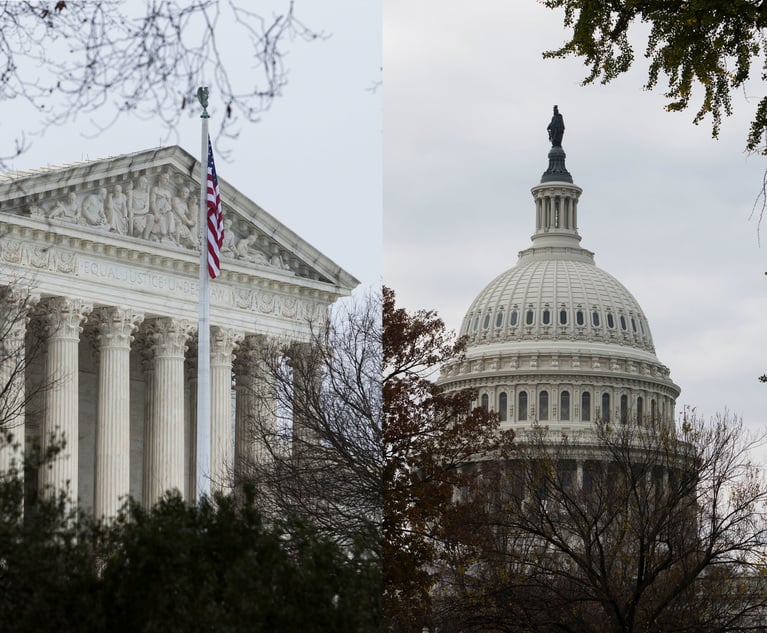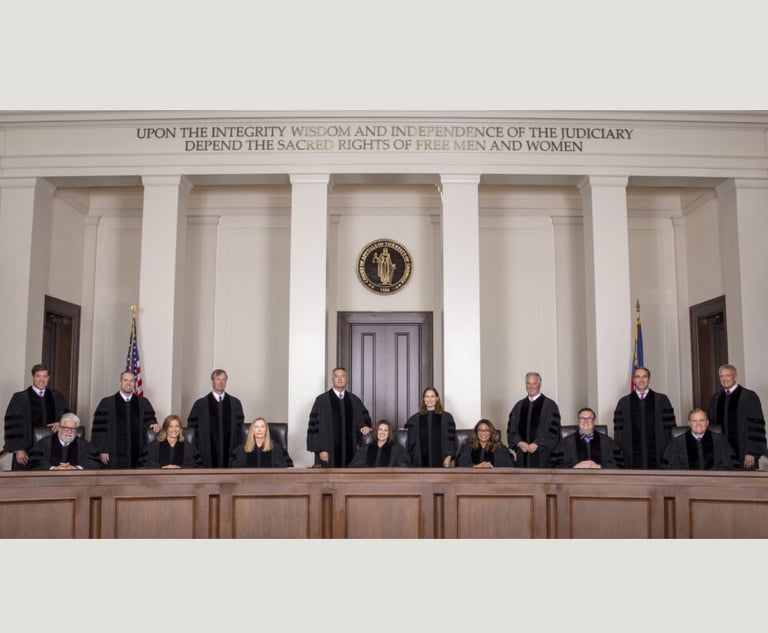Brexit Hits UK Law Firms in S. Korea; Seoul Offices May Be Forced to Close Temporarily
The five U.K. firms present in Seoul—Clifford Chance, Herbert Smith Freehills, Linklaters, Stephenson Harwood and Allen & Overy—will have to either re-register their office licenses or close their offices, at least temporarily.
March 06, 2019 at 12:33 AM
7 minute read
By John Kang
A group of U.K.-based law firms in South Korea are anxious about the future of their offices in Seoul, as a no-deal Brexit could force them to close their offices temporarily.
Currently, the five U.K. firms in Seoul – Clifford Chance, Herbert Smith Freehills, Linklaters, Stephenson Harwood, and Allen & Overy – operate their foreign legal consultant offices under a free trade agreement (FTA) between Korea and the European Union.
But once the U.K. leaves the E.U., those offices will no longer be covered under the FTA. And it is therefore not clear that their Seoul offices will be able to continue their operations after March 29, when Britain is scheduled to withdraw from the E.U.
While Britain hopes to extend the existing FTAs it has enjoyed as part of the E.U., including that with Korea, that is not likely to happen after it leaves the E.U. Under the U.K.'s proposed withdrawal agreement, which has not yet been approved by parliament, the E.U. trade bloc would ask its FTA partners to extend the benefits of the deals to the U.K. during a 21-month transition period, as the U.K. negotiates its own trade deals.
But that would occur only if the British Parliament approves the withdrawal deal. On January 15, the House of Commons rejected a deal proposed by Prime Minister Theresa May; a revised deal will be put before members of parliament for another vote by March 12. If the revised deal is again voted down, the situation could get worse as Britain could potentially leave the E.U. without a withdrawal agreement, known as a no-deal Brexit.
Deal or no deal, Brexit will likely happen without a U.K.-Korea FTA. For U.K. law firms in Seoul, one option is to change the office licence so it is registered under a home jurisdiction that does have a live FTA with Korea, such as the U.S. or Australia, according to Mickael Laurans, head of the international department at the Law Society of England and Wales.
Herbert Smith Freehills, the product of a 2012 merger between U.K. firm Herbert Smith and Australia's Freehills, is trying to change its Seoul registration so it can be registered as an Australian firm. The firm's current Seoul office representative, Mike McClure, said he hopes the application will be approved by the end of March. According to the firm's website, Australian-qualified senior projects associate Ken Nam is the only lawyer that qualifies to be the new Seoul office representative.
“Herbert Smith Freehills remains committed to South Korea for the long term and we hope that our solution to this situation provides certainty to both our clients and our people in this market,” said McClure, who is also a director of the British Chamber of Commerce in Korea and chairman of its market access committee.
Currently, the Korean Foreign Legal Consultant Act (FLCA) does not allow the switching of the Seoul office licence in the midst of its operation, said Taeyeop Kim, an official at the international legal affairs division of the Korean Ministry of Justice, who manages the foreign legal consultants and foreign legal consultant offices.
“Instead, for this to practically happen, the Ministry of Justice must first cancel the licence of the current foreign legal consultant office and then receive a new application for a foreign legal consultant office based on a separate FTA,” Kim explained.
Other than Herbert Smith Freehills, this type of licence switch has occurred only once before. In 2014, DLA Piper had to change its Seoul office registration from a U.K. partnership to a U.S. partnership when former office representative Michael Kim, an English lawyer, left the firm and was replaced by U.S.-qualified Daniel Lee; the firm closed its Seoul office for four working days during the transition. Under Korean regulations, the Seoul office of foreign firms must have an office representative who is qualified in the same jurisdiction with which the office is registered.
But DLA Piper is an odd case: the firm's U.S. and U.K. partnerships are structured in a Swiss verein and are not fully financially integrated. In addition, the firm's management is split between London, New York and San Diego. The FLCA requires foreign firms to register their Seoul outpost with a firm that has a “principal office” where the “highest decisions are made” in a jurisdiction that is a contracting party to an FTA with Korea.
Kim of the justice ministry said a ”principal office” under the FLCA is an office that “substantially functions as a headquarters that encompasses the other offices”, and that “whether [an] office fits as a principal office can only be decided on a case-by-case basis after the application is submitted”.
So far, no non-verein firm has successfully switched its licence. Last year, London-based Clyde & Co did consider launching a Seoul office under its U.S. partnership Clyde & Co U.S., but it put the plan on hold.
For those unable to do the licence switch, the prospect is dire.
“Leaving Seoul, with its consequential loss of local jobs and investment, may be the only option left,” said the Law Society's Laurans. “Although they could still service South Korean clients from Hong Kong, Singapore, Tokyo or indeed London.”
Currently, the five U.K.-based firms have about 30 lawyers based in Seoul.
One U.K. firm Seoul partner, who requested anonymity because of the sensitivity of the matter, said the firm won't be able to switch its licence and plans to temporarily close the Seoul office until an FTA between the U.K. and Korea is signed. If that's the case, said the partner, fee-earners can relocate to other offices such as London and Singapore and continue to provide English law advice. Korean clients are not worried, according to the partner.
But the Seoul partner and the U.K. Law Society are hoping it won't come to that. “The U.K. firms are hoping the British and South Korean governments agree to a grace period, such as six months,” the partner said.
According to Kim, the Korean Ministry of Justice is still in the process of reviewing internally whether a grace period can be granted after Brexit.
The British and Korean governments are also keen to make bilateral trade agreements if there is a no-deal Brexit. The Korean minister for trade, industry and energy, Kim Hyun-chong, met with his U.K. counterpart, Liam Fox, in January to discuss the two countries' post-Brexit relationship, including a U.K.-Korea FTA, Yonhap news agency reported. ”It is a question of when, not if,” the Seoul partner said of the FTA.
Laurans said the U.K. Law Society and its members have also been engaging with the Korean Ministry of Justice and Ministry of Trade on the uncertain status of the U.K. firms' Seoul offices.
“[The Korean government] is still considering [its] course of action after [March 29], should a U.K.-South Korea agreement not be in place at the time,” he said.
According to the Seoul partner, the five U.K. firms in Seoul have spoken to the British Embassy in Korea and to the Korean Ministry of Justice, and both declined to explain what will happen to the firms after Brexit. They said they would wait to see the outcome of the next vote by Parliament on the revised Brexit deal.
An official at the British Embassy in Korea said last week it remains unclear what will happen to the U.K.-based firms in Seoul, but they have asked the Korean Ministry of Justice, which will have the final say about the fate of the firms.
“It's quite unhelpful,” said the Seoul partner. “But you can understand they are not in a position to make any comments until there is certainty.”
|Related Stories:
This content has been archived. It is available through our partners, LexisNexis® and Bloomberg Law.
To view this content, please continue to their sites.
Not a Lexis Subscriber?
Subscribe Now
Not a Bloomberg Law Subscriber?
Subscribe Now
NOT FOR REPRINT
© 2025 ALM Global, LLC, All Rights Reserved. Request academic re-use from www.copyright.com. All other uses, submit a request to [email protected]. For more information visit Asset & Logo Licensing.
You Might Like
View All
Roberts Calls Court's Relationship With Congress 'Strained.' Who's to Blame?

Thwarting of $14B US Steel Deal Won't Dampen Japan-U.S. M&A, Lawyers Say

Few Atlanta-Centric Law Firms Expected to Pay Associate Bonuses at Market Scale
5 minute read
Experts Not Foreseeing More Rules Governing Prosecutors' Actions After Georgia Court's Removal of DA From Election Case
8 minute readTrending Stories
Who Got The Work
Michael G. Bongiorno, Andrew Scott Dulberg and Elizabeth E. Driscoll from Wilmer Cutler Pickering Hale and Dorr have stepped in to represent Symbotic Inc., an A.I.-enabled technology platform that focuses on increasing supply chain efficiency, and other defendants in a pending shareholder derivative lawsuit. The case, filed Oct. 2 in Massachusetts District Court by the Brown Law Firm on behalf of Stephen Austen, accuses certain officers and directors of misleading investors in regard to Symbotic's potential for margin growth by failing to disclose that the company was not equipped to timely deploy its systems or manage expenses through project delays. The case, assigned to U.S. District Judge Nathaniel M. Gorton, is 1:24-cv-12522, Austen v. Cohen et al.
Who Got The Work
Edmund Polubinski and Marie Killmond of Davis Polk & Wardwell have entered appearances for data platform software development company MongoDB and other defendants in a pending shareholder derivative lawsuit. The action, filed Oct. 7 in New York Southern District Court by the Brown Law Firm, accuses the company's directors and/or officers of falsely expressing confidence in the company’s restructuring of its sales incentive plan and downplaying the severity of decreases in its upfront commitments. The case is 1:24-cv-07594, Roy v. Ittycheria et al.
Who Got The Work
Amy O. Bruchs and Kurt F. Ellison of Michael Best & Friedrich have entered appearances for Epic Systems Corp. in a pending employment discrimination lawsuit. The suit was filed Sept. 7 in Wisconsin Western District Court by Levine Eisberner LLC and Siri & Glimstad on behalf of a project manager who claims that he was wrongfully terminated after applying for a religious exemption to the defendant's COVID-19 vaccine mandate. The case, assigned to U.S. Magistrate Judge Anita Marie Boor, is 3:24-cv-00630, Secker, Nathan v. Epic Systems Corporation.
Who Got The Work
David X. Sullivan, Thomas J. Finn and Gregory A. Hall from McCarter & English have entered appearances for Sunrun Installation Services in a pending civil rights lawsuit. The complaint was filed Sept. 4 in Connecticut District Court by attorney Robert M. Berke on behalf of former employee George Edward Steins, who was arrested and charged with employing an unregistered home improvement salesperson. The complaint alleges that had Sunrun informed the Connecticut Department of Consumer Protection that the plaintiff's employment had ended in 2017 and that he no longer held Sunrun's home improvement contractor license, he would not have been hit with charges, which were dismissed in May 2024. The case, assigned to U.S. District Judge Jeffrey A. Meyer, is 3:24-cv-01423, Steins v. Sunrun, Inc. et al.
Who Got The Work
Greenberg Traurig shareholder Joshua L. Raskin has entered an appearance for boohoo.com UK Ltd. in a pending patent infringement lawsuit. The suit, filed Sept. 3 in Texas Eastern District Court by Rozier Hardt McDonough on behalf of Alto Dynamics, asserts five patents related to an online shopping platform. The case, assigned to U.S. District Judge Rodney Gilstrap, is 2:24-cv-00719, Alto Dynamics, LLC v. boohoo.com UK Limited.
Featured Firms
Law Offices of Gary Martin Hays & Associates, P.C.
(470) 294-1674
Law Offices of Mark E. Salomone
(857) 444-6468
Smith & Hassler
(713) 739-1250









